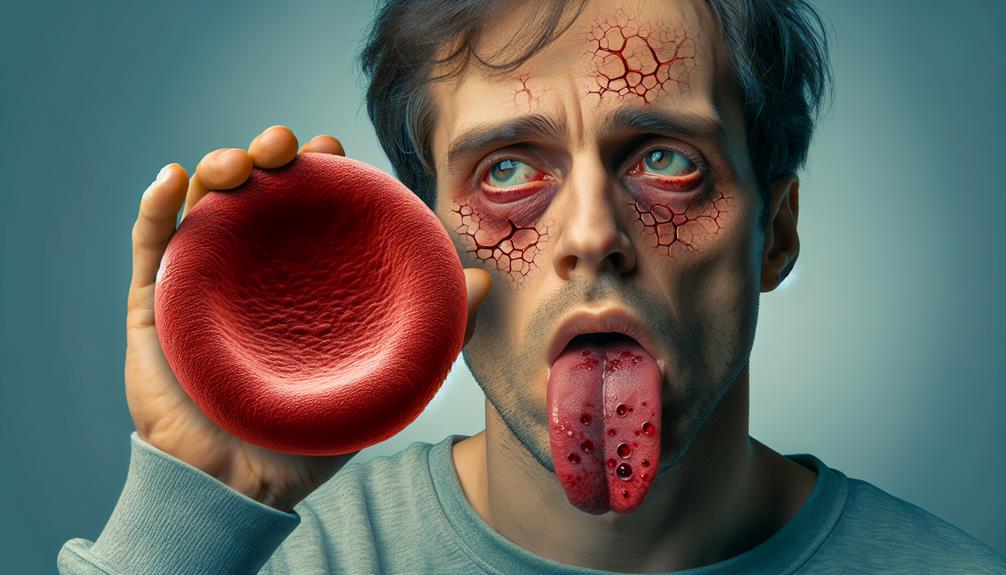







If you're feeling tired, have pale skin, or notice cracked lips, you may lack Vitamin B2 (Riboflavin). Eye troubles like vision changes can also signal deficiency. Your cognitive function might suffer, leading to forgetfulness. Anemia symptoms like weakness could indicate low riboflavin levels. You'd benefit from knowing more about dietary sources and consulting healthcare providers for persistent issues.
Key Takeaways
- Eye troubles like vision changes, light sensitivity, and blurred vision signal Riboflavin deficiency.
- Anemia symptoms such as weakness and fatigue can indicate a lack of Riboflavin.
- Cognitive issues like forgetfulness and impaired brain function may result from Riboflavin deficiency.
- Skin disorders including dryness, cheilitis, and dermatitis can be signs of inadequate Riboflavin.
- Riboflavin-rich foods like dairy, meats, and leafy greens are vital for preventing deficiency symptoms.
Pale Skin
If you notice that your skin appears unusually pale, it could be a sign of Vitamin B2 (Riboflavin) deficiency. Riboflavin plays an important role in maintaining healthy skin, and its deficiency can manifest as paleness. To address this deficiency, incorporating specific dietary sources rich in Vitamin B2 is vital. Foods like dairy products, lean meats, green leafy vegetables, and nuts are excellent sources of Riboflavin. Including these in your daily meals can help improve your Riboflavin levels and combat the symptoms of pale skin.
In addition to dietary sources, supplement options are available to boost your Vitamin B2 intake. Riboflavin supplements are widely accessible and can be an effective way to make sure you are meeting your daily requirements. Consult with a healthcare provider to determine the appropriate dosage and form of supplements that best fit your needs. By combining dietary adjustments with supplement options, you can effectively address Vitamin B2 deficiency and restore a healthy complexion.
Eye Issues
Addressing eye issues associated with Vitamin B2 deficiency involves understanding the critical role Riboflavin plays in maintaining peak eye health. Vitamin B2, also known as Riboflavin, is essential for peak ocular health. When deficient in Vitamin B2, various eye problems can arise, affecting your vision and overall eye function.
One of the key signs of Vitamin B2 deficiency is vision changes. These changes may manifest as increased sensitivity to light, blurred vision, or even a feeling of grittiness in the eyes. Riboflavin contributes to the production of antioxidants that help protect the eyes from oxidative damage, making it vital for maintaining clear vision.
Furthermore, inadequate levels of Vitamin B2 can impact overall ocular health. Riboflavin is involved in the maintenance of the cornea, the thin outer layer of the eye, as well as in the formation of tears that keep the eyes moist and nourished. Ensuring an adequate intake of Vitamin B2 through diet or supplements is essential for preserving eye health and preventing vision-related issues.
Fatigue

Fatigue can be a common symptom associated with Vitamin B2 deficiency, impacting your energy levels and overall well-being. When your body lacks an adequate amount of Vitamin B2, it can lead to decreased energy levels, leaving you feeling tired and sluggish. This fatigue may affect your daily activities and productivity, making it essential to address any potential deficiencies promptly.
Maintaining proper nutritional balance is vital for ideal energy levels, and Vitamin B2 plays a significant role in this aspect. Riboflavin is involved in converting carbohydrates into adenosine triphosphate (ATP), which is the primary energy currency of the cell. Without enough Vitamin B2, this energy production process can be compromised, contributing to feelings of fatigue.
If you are experiencing persistent fatigue, it is advisable to consult with a healthcare provider to determine if a Vitamin B2 deficiency could be the underlying cause. By addressing any deficiencies and ensuring your nutritional needs are met, you can support your energy levels and overall well-being.
Cracked Lips
Maintaining sufficient levels of Vitamin B2 is crucial for overall health, and one noticeable sign of deficiency can appear as cracked lips. When your body lacks a sufficient amount of riboflavin, your lips may become dry, flaky, and prone to cracking. Cracked lips, also known as cheilitis, can be uncomfortable and make simple tasks like eating or talking painful.
To help alleviate cracked lips due to a Vitamin B2 deficiency, consider using a lip balm regularly. Look for a lip balm that contains moisturizing ingredients like beeswax or shea butter to help hydrate and protect your lips. Additionally, make sure you stay hydrated throughout the day by drinking plenty of water. Hydration is key to maintaining healthy skin, including your lips.
Digestive Problems

Digestive issues can indicate a potential deficiency in Vitamin B2 (Riboflavin), impacting your overall well-being and digestive health. Riboflavin plays a vital role in maintaining a healthy digestive system by assisting in the breakdown of fats, proteins, and carbohydrates. Without sufficient Vitamin B2, your body may struggle to absorb essential nutrients properly, leading to digestive problems like bloating, gas, and constipation.
Furthermore, Vitamin B2 deficiency can affect gut health. The gut is lined with cells that depend on adequate riboflavin levels to function at their best. Inadequate Vitamin B2 can weaken these cells, compromising the integrity of the gastrointestinal tract. This can result in reduced nutrient absorption, inflammation, and an imbalance of gut bacteria, potentially causing more serious digestive complications over time.
To support your digestive system and overall health, make sure you are consuming enough Vitamin B2 through a balanced diet or supplements. If you experience persistent digestive issues, seek advice from a healthcare provider to determine if a riboflavin deficiency could be the underlying cause.
Mouth Sores
A common indicator of Vitamin B2 (Riboflavin) deficiency is the occurrence of painful mouth sores. These oral ulcers can develop on the inside of your lips, cheeks, or tongue, causing discomfort and difficulty eating or speaking. Inadequate levels of Vitamin B2 can compromise oral health, leading to an increased susceptibility to mouth sores.
Riboflavin plays a vital role in maintaining oral health by supporting the growth and repair of tissues in the mouth. Without sufficient Vitamin B2, the body may struggle to effectively heal and protect the delicate tissues inside the mouth, making you more prone to developing sores and other oral health issues.
Furthermore, Vitamin B2 is essential for proper nutrient absorption in the body. A deficiency in this vitamin can hinder the absorption of other nutrients crucial for overall health, potentially exacerbating oral health issues like mouth sores. Ensuring an adequate intake of Vitamin B2 is essential not only for oral health but also for optimal nutrient absorption and overall well-being.
Hair Loss
Hair loss can be a significant sign of Vitamin B2 (Riboflavin) deficiency, impacting both men and women alike. When your body lacks sufficient Vitamin B2, it can affect your scalp health, leading to hair thinning and loss. Riboflavin is important for maintaining proper nutrient levels in your body, which in turn supports healthy hair growth. Adequate vitamin levels are essential for the production of red blood cells that nourish hair follicles and promote strong, vibrant hair.
If you are experiencing unexplained hair loss, it might be beneficial to assess your vitamin intake, including Vitamin B2. A deficiency in this essential nutrient can disrupt the natural hair growth cycle and result in noticeable thinning or shedding. Ensuring you have ample Vitamin B2 in your diet or through supplements can help support scalp health and combat nutrient deficiencies that contribute to hair loss. Remember, maintaining a balanced diet rich in essential vitamins and minerals is key to promoting the best hair growth and overall well-being.
Cognitive Impairment
Poor cognitive function can be a notable consequence of Vitamin B2 (Riboflavin) deficiency. Memory loss and difficulty concentrating are common signs of cognitive impairment resulting from inadequate levels of Vitamin B2 in your body. Riboflavin plays an important role in brain function, and when deficient, you may experience brain fog and struggle with mental clarity.
When your body lacks sufficient Vitamin B2, the brain's ability to maintain peak cognitive function is compromised. This can manifest as forgetfulness, reduced ability to focus, and overall cognitive sluggishness. If you find yourself struggling with tasks that once came easily to you or experience a decline in your ability to remember details, it may be worth considering your riboflavin intake.
To support your cognitive health, make sure your diet includes riboflavin-rich foods like dairy products, lean meats, eggs, leafy green vegetables, and nuts. If you suspect a deficiency, consulting a healthcare professional for appropriate testing and guidance is advisable. Remember, maintaining adequate levels of Vitamin B2 is essential for peak cognitive function and mental clarity.
Anemia

Experiencing fatigue and weakness may signal a potential consequence of Vitamin B2 (Riboflavin) deficiency known as anemia. Anemia is often linked to a lack of healthy red blood cells, which can impact the body's ability to transport oxygen efficiently. When Vitamin B2 levels are low, the body may struggle with proper red blood cell production, leading to anemia. Iron deficiency is a common cause of anemia, and Vitamin B2 plays a significant role in maintaining ideal iron levels in the body. Without sufficient riboflavin, the absorption of essential nutrients like iron may be compromised, exacerbating anemia symptoms. Ensuring an adequate intake of Vitamin B2 is essential for supporting nutrient absorption and preventing anemia. If you're experiencing persistent fatigue and weakness, consulting a healthcare provider for proper evaluation and potential supplementation is recommended to address possible Vitamin B2 deficiency and its impact on anemia.
Skin Disorders
If you notice persistent changes in your skin's appearance, it may be indicative of potential Vitamin B2 (Riboflavin) deficiency leading to skin disorders. Vitamin B2 plays an important role in maintaining healthy skin, and its deficiency can manifest in various skin issues. One common sign of Vitamin B2 deficiency is cracked or inflamed skin around the mouth, known as cheilitis. Additionally, dermatitis, a condition characterized by itchy and scaly skin, can also be a result of insufficient Vitamin B2 levels.
Skin disorders related to Vitamin B2 deficiency can impact skin hydration, leading to dryness and flakiness. Ensuring an adequate intake of Vitamin B2 through dietary sources such as dairy products, lean meats, eggs, and leafy green vegetables is essential in promoting healthy skin. By incorporating these foods into your diet, you can support proper skin function and reduce the risk of developing skin disorders associated with Vitamin B2 deficiency. Remember, maintaining a balanced and nutritious diet is key to overall skin health.





